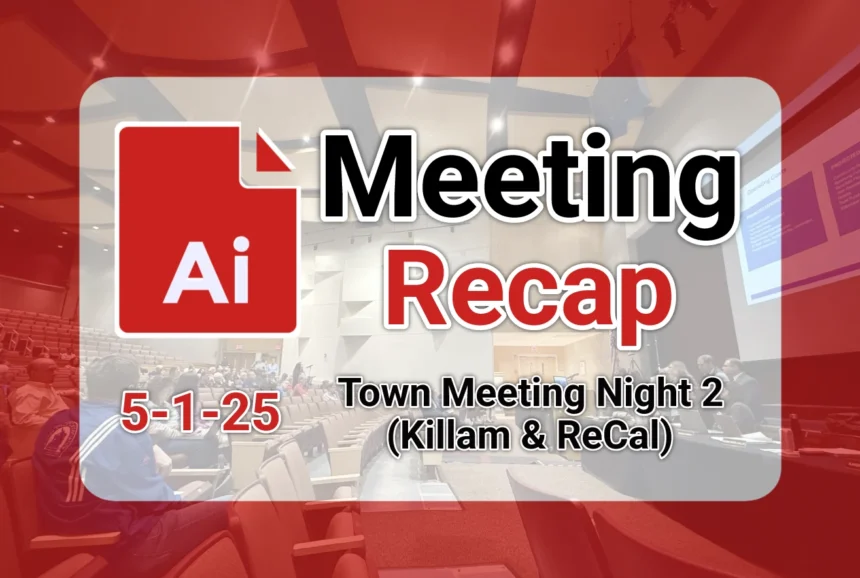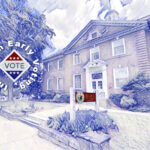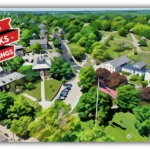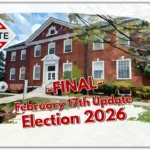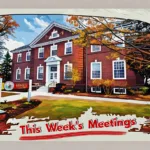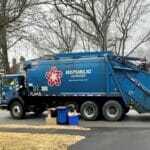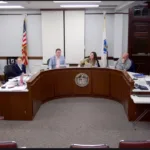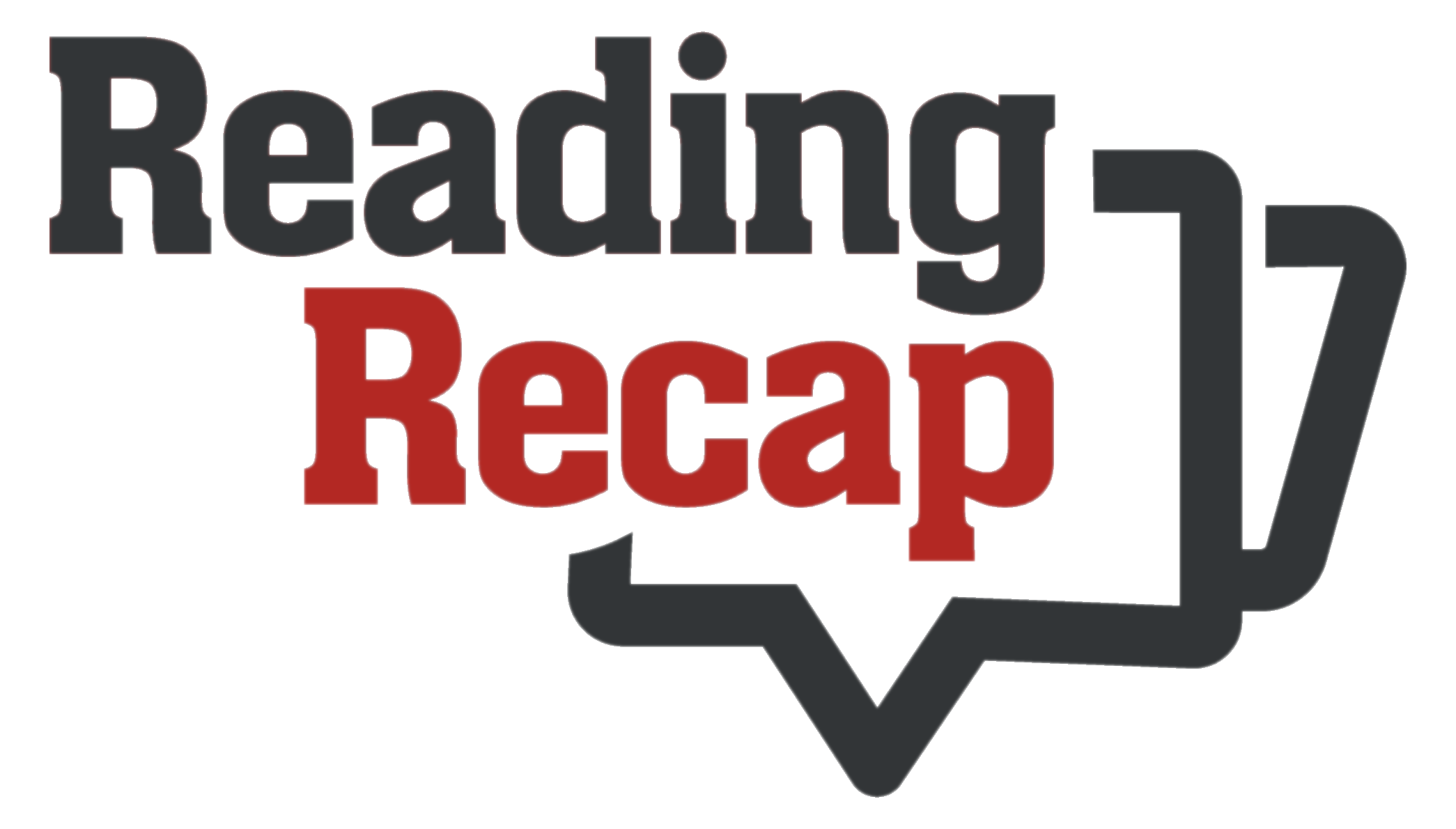Below is a summarized version of the Special Town Meeting (Articles 2 and 3), organized by timestamps and speakers, focusing on key points raised during the discussion in Reading, Massachusetts. The meeting included both the annual town meeting and a special town meeting to discuss two key projects: the Killam Elementary School replacement and the Reading Center for Active Living (ReCAL). This summary condenses the discussion into major themes, speaker contributions, and decisions, avoiding excessive detail while retaining the essence of the conversation. Timestamps correspond to the video linked at the bottom.
Contents
Opening and Procedural Setup
- 12:24: The Moderator calls the annual town meeting to order, confirming a quorum.
- 12:30: The Moderator leads the Pledge of Allegiance.
- 12:51–13:43: The Moderator explains the meeting structure:
- The annual town meeting (started on Monday) will be briefly adjourned to address the special town meeting, which has two warrant items: the Killam School project and the ReCAL project.
- If time runs out, the annual meeting will reconvene on May 5, 2025, at 7:30 PM.
- 13:54–14:19: Miss Murphy moves to adjourn the annual town meeting until the special town meeting concludes or until May 5, 2025, if the special meeting runs long. The motion carries.
- 14:26: The Moderator opens the special town meeting.
- 14:33–15:30: The Town Clerk reads the warrant for the special town meeting, and Miss Murphy moves to dispense with further reading except for the return. The motion carries.
Article 1: Killam Elementary School Project
- 16:30–20:55: Discussion on procedural implications of votes:
- Mr. Arena (16:45) asks about the consequences of an affirmative or negative vote at the town meeting versus the ballot vote.
- Town Clerk and Town Counsel (17:12–18:19) clarify that the town meeting approves the project and borrowing, while the ballot vote (May 13, 2025) approves debt exclusion under Proposition 2½. If the town meeting approves but the ballot fails, the debt is not authorized. If the town meeting rejects but the ballot approves, a special town meeting could be called within 120 days to reconsider, or the project (especially Killam, tied to MSBA funding) could be terminated.
- Mike Carroll (20:19), Colliers project manager, notes that a failed town meeting vote followed by a positive ballot vote would require notifying the Massachusetts School Building Authority (MSBA). A special town meeting could be called within 120 days to reconsider; otherwise, the project ends, and MSBA funding is lost.
- 22:38–30:42: Pat Tompkins, Chair of the Permanent Building Committee, presents:
- The committee, formed in 2015, oversees large-scale construction projects and has assessed town facilities since 2019, identifying aging infrastructure.
- School buildings (average age 29 years) and municipal buildings (average age 35 years) need upgrades every 6–7 years. The last major school project was in 2006, and the library was completed in 2010, indicating a need for reinvestment.
- The committee supports both Killam and ReCAL, committing to sustainable, high-quality buildings within budget, with contingencies to manage costs and avoid additional funding requests.
- 30:48–56:29: Killam School Building Committee Presentation:
- Dr. Milaschewski (31:31) outlines the need for a new Killam School due to physical plant issues (1969 building, no major renovations) and programmatic deficiencies (e.g., inadequate classroom spaces, limited technology).
- Joe Huggins (33:09), Director of Facilities, details physical issues: outdated doors/windows, ADA inaccessibility, water infiltration, and the building reaching the end of its useful life.
- Dr. Milaschewski (35:12) highlights benefits:
- Improved learning environment for Killam students.
- Consolidation of the RISE preschool program (currently across three sites) into 12 classrooms at Killam, with MSBA reimbursement for pre-K spaces.
- Additional classroom space to accommodate projected enrollment growth (100 students in five years per 2022 McKibben study).
- Freed space at Reading Memorial High School (RMHS) for robotics and engineering labs.
- Carla Nazzaro (41:39) presents the site plan and design:
- A three-story building with a modern, energy-efficient design, including natural light, durable materials, and community spaces (e.g., bleacher seating for 200).
- The site plan improves traffic flow with bus entry on Haverhill Street and parking on Charles Street.
- Carla Nazzaro (47:22) explains the MSBA process:
- The MSBA funds school projects with reimbursements based on eligible costs. Reading submitted a statement of interest in 2021, was one of 11 districts selected, and is now in Module 5 (funding).
- On April 30, 2025, the MSBA board approved funding, giving Reading 120 days to secure local funding.
- Shawn Brandt (50:39) discusses community engagement:
- Over 60 meetings, including educational visioning sessions and school tours, ensured the design reflects community priorities (e.g., grade-level classroom pods, sustainable design, safe traffic flow).
- Sharon Angstrom (54:44) presents financials:
- Total project cost: $130,111,783.
- MSBA contribution: $44,182,227.
- Town share: $85,829,556 ($80.50 per $100,000 of assessed home value, or $716.45 annually for an $890,000 home).
- Recent debt payoffs (high school, Wood End, library) save taxpayers $386.80 annually, reducing the net impact to $329.65.
- Carla Nazzaro (56:35) on consequences of a failed vote:
- Loss of $44 million MSBA funding, which would go to another district.
- Continued use of the inadequate Killam building, with classes in closets and storage in hallways.
- Minimum cost to bring the existing building to code: $61 million (100% town-funded) for a school half the size of the proposed $85 million new school.
- 59:38–1:02:11: Ed Ross, Finance Committee, reports:
- The Finance Committee has been involved since the project’s inception, overseeing hiring and funding mechanisms (MSBA, federal incentives).
- The MSBA process is prescriptive and transparent, with cost considerations integrated throughout.
- On April 2, 2025, the Finance Committee voted 5–0 to recommend the article.
- 1:02:23–1:03:37: Discussion:
- John Arena asks about RISE program capacity (currently 150 students across 10 classrooms, with a 64-student waitlist). Dr. Milaschewski confirms the new building will have 12 classrooms, increasing capacity to 180 students.
- John Arena asks about contingency funds. Pat Tompkins estimates 5% of hard costs (specific amount not provided).
- Outcome:
- The Killam School project motion passed, 158-1 and the special town meeting proceeded to Article 2.
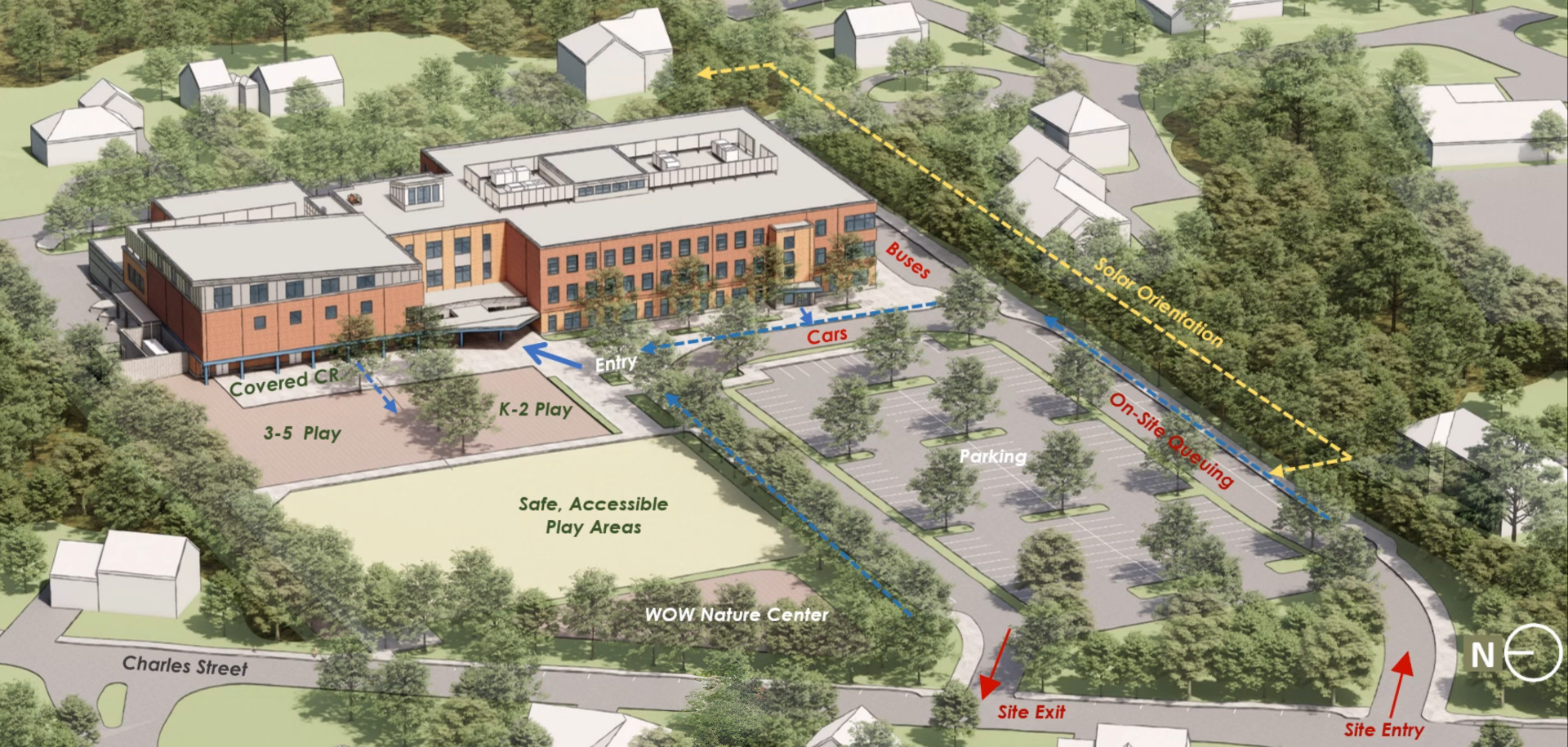
Article 2: Reading Center for Active Living (ReCAL)
- (Timestamp not specified in excerpt, but follows Article 1): Presentation:
- Pat Tompkins and others present the ReCAL project, a proposed multigenerational community center to replace the inadequate Pleasant Street Center (150 years old, with mold and accessibility issues).
- The project costs $27.9 million for a 28,000-square-foot building on Range Road/Symonds Way, selected after evaluating multiple sites (including Oakland Road and Pleasant Street).
- Features include a gym, multipurpose rooms, veterans’ services, Council on Aging offices, and community spaces, designed to serve all ages with priority for seniors (60+).
- Financials:
- Estimated cost: $27.9 million, with borrowing at 3% interest (AAA bond rating).
- Operational cost increase: $200,000–$300,000 annually, offset by $250,000–$320,000 in revenue from rentals (e.g., gym for basketball) and potential income from redeveloping/leasing the Pleasant Street Center.
- Community engagement: Over 60 public meetings, including 15 on location, with 1,400+ survey responses prioritizing multigenerational use and sustainability.
- Concerns addressed:
- Location near Reading Rifle and Revolver Club: Triple-pane windows mitigate noise. The Council on Aging and veterans’ officer (who spoke at 4:26:46) support the site, noting veterans with PTSD can manage expected gunfire noise.
- Transportation: Plans include vans, grant-funded Uber/Lyft programs, and surveys to assess senior mobility needs.
- Historical Pleasant Street Center: On the historical inventory, but not protected from demolition. Suggestions for preservation (e.g., deed restrictions) were raised.
- Key Discussion Points:
- Supporters:
- Emphasize the need for a modern facility to serve Reading’s 7,000 seniors (2,000 regularly use the current center), with waitlists for programs.
- View it as a necessary “home improvement” for the community, lasting decades.
- Highlight extensive community input (60+ meetings) and affordability ($20/month for some households).
- Opponents:
- Cite “sticker shock” at $27.9 million, suggesting a downscaled version without a time-sensitive funding deadline (unlike Killam’s MSBA funds).
- Question the location due to gunfire noise, which could deter users or affect veterans with PTSD.
- Argue the survey may not represent seniors without online access and that the multigenerational focus feels senior-prioritized, not equally accessible.
- Pickleball Clarification (3:46:31–3:48:24, Ann Rand, Miss Wellman):
- No pickleball courts are included in the $27.9 million; they are a separate project under Article 14, with temporary gym use possible but not dedicated.
- Financial Concerns (3:44:34–3:46:04, Speaker, Sharon Angstrom):
- Borrowing at 3% is cost-effective, but costs could rise with market fluctuations. Borrowing in tranches was suggested but limited by arbitrage rules.
- Pleasant Street Center (3:58:03–4:00:41, Jonathan Barnes):
- Its historical significance (1883, first municipal building, designed by Horus Wadlin) was emphasized, urging preservation considerations.
- Veterans’ Perspective (4:26:46):
- The VA officer confirms veterans can handle expected gunfire noise, alleviating PTSD concerns.
- Council on Aging (4:28:23, Miss Wellman):
- Unanimously supports the Range Road location.
- Tax Impact on Seniors (4:29:25, Ryan Johnstone, Miss Wellman):
- Concerns about pricing out fixed-income seniors were addressed with tax deferral, work-off programs, and abatements adjusted for inflation.
- Supporters:
- 4:32:27–4:35:16: Vote on Article 2:
- Taylor Gregory moves to end debate, which passes (133–7, two-thirds required).
- The main motion for the ReCAL project passes with a two-thirds vote (101–43).
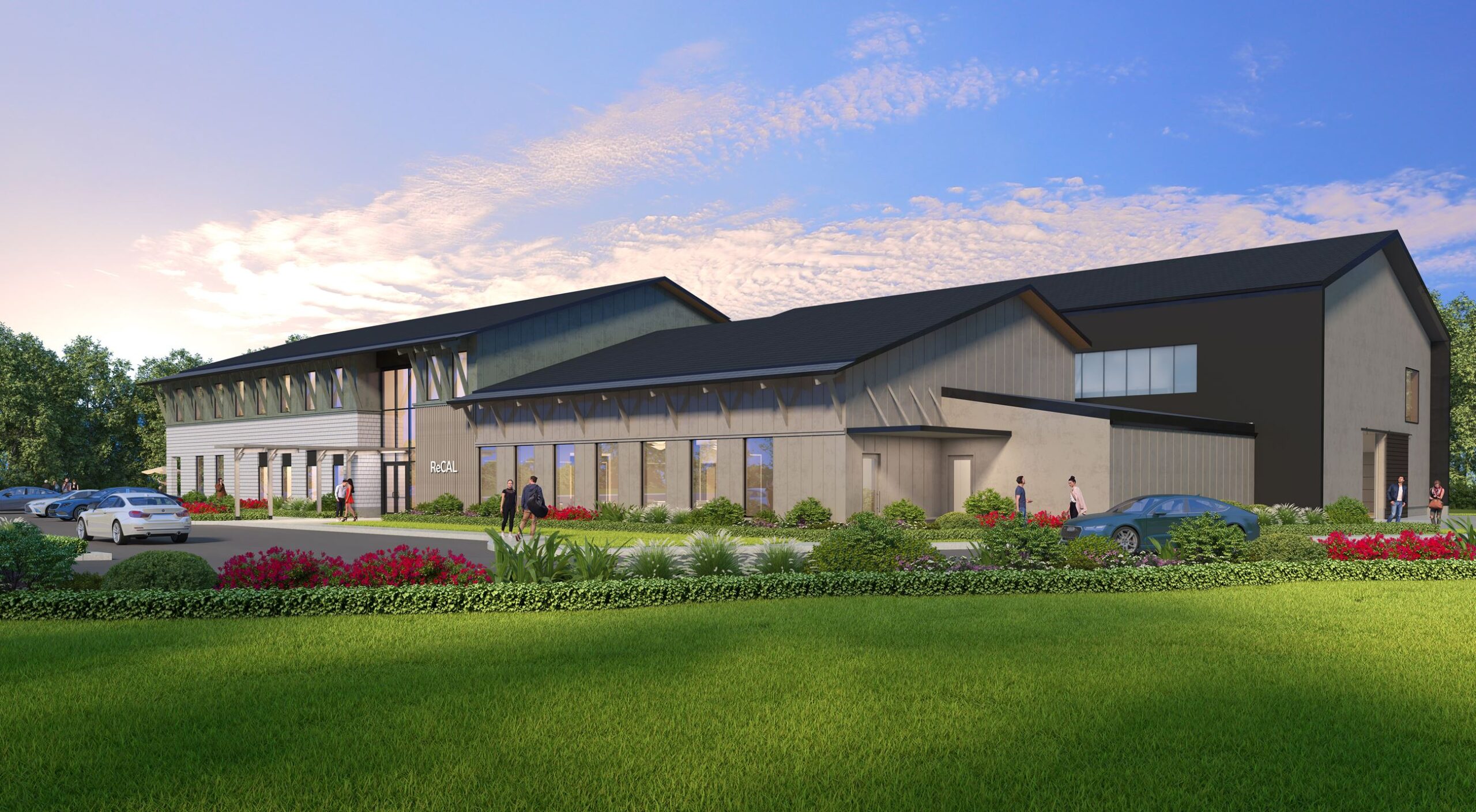
Closing
- 4:35:28–4:36:00:
- Miss Murphy moves to adjourn the special town meeting sine die, which passes.
- The annual town meeting is reopened, and a motion to adjourn until May 5, 2025, at 7:30 PM carries.
Key Outcomes
- Killam Elementary School Project:
- Approved 158-1 (two-thirds required).
- $130.1 million project, with $44.2 million MSBA funding and $85.8 million town share.
- Replaces the 1969 Killam School with a modern, energy-efficient building, consolidates RISE preschool, and supports RMHS programs.
- A failed vote would lose MSBA funding, requiring $61 million (town-funded) to bring the existing building to code.
- Reading Center for Active Living (ReCAL):
- Approved with a 101–43 vote (two-thirds required).
- $27.9 million for a 28,000-square-foot multigenerational center on Range Road/Simons Way.
- Addresses inadequacies of the Pleasant Street Center, with revenue from rentals and potential Pleasant Street redevelopment to offset operational costs.
- Concerns about location (gun range proximity) and cost were debated, but extensive community input and mitigation measures (e.g., triple-pane windows, transportation plans) supported approval.
- Procedural:
- The special town meeting adjourned sine die, and the annual town meeting was adjourned to May 5, 2025, at 7:30 PM.


